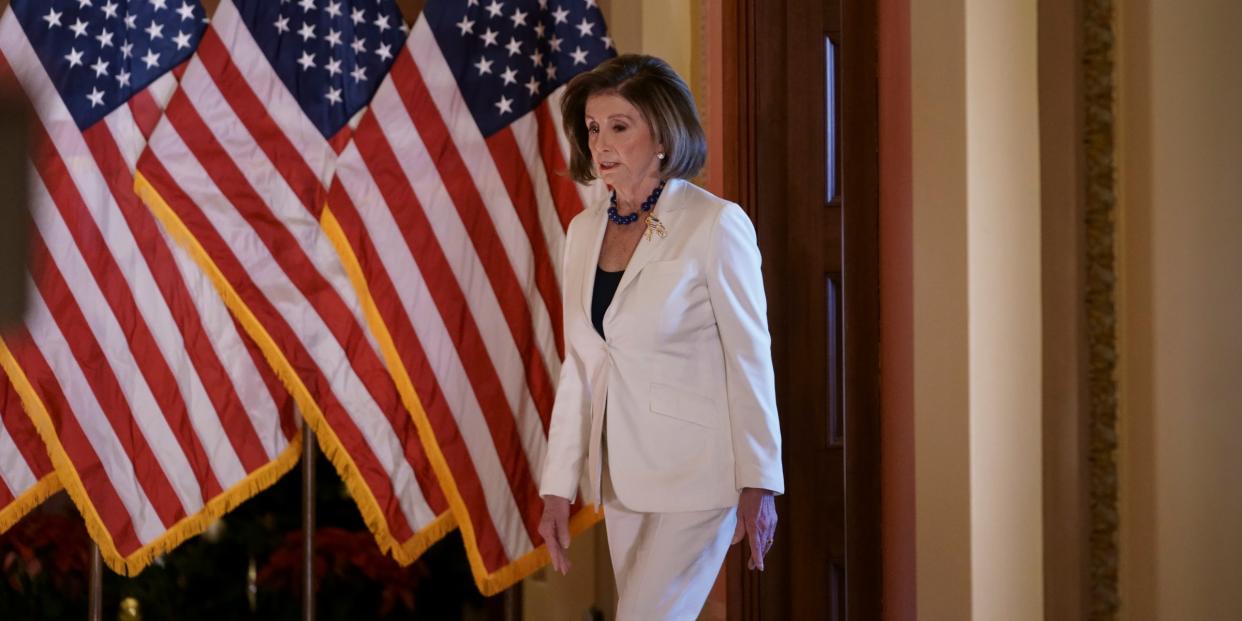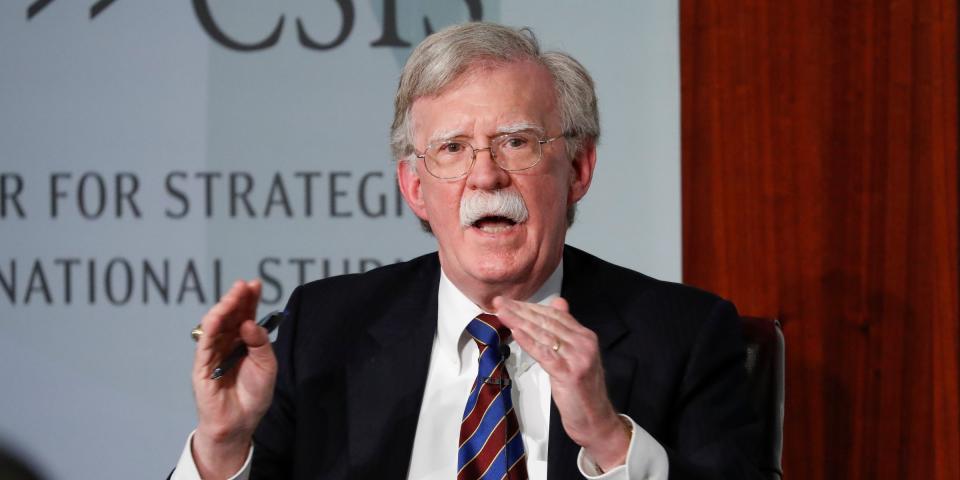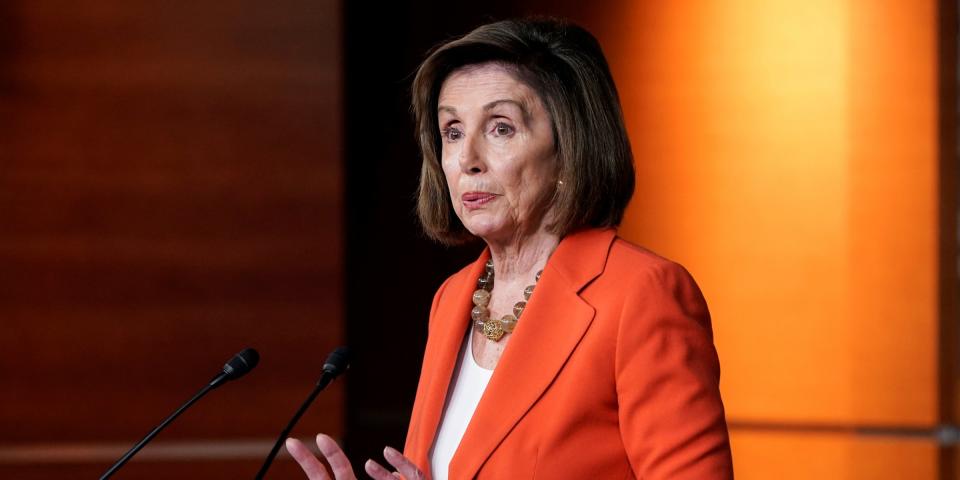What comes next in the House's impeachment inquiry into Trump

Associated Press
In November, the impeachment inquiry into President Donald Trump moved into its public phase, with a roster of current and former Trump administration officials publicly testifying before the House Intelligence Committee.
The Intelligence Committee is set to meet on Tuesday evening and submit a report on its findings to the Judiciary Committee, which traditionally writes and first votes on articles of impeachment.
The Judiciary Committee is also set to hold its first public hearing on the impeachment inquiry on December 4 featuring no material witnesses, but a panel of four constitutional law experts.
Of those close to Trump poised to potentially testify next, none may be more damaging than former national security adviser John Bolton, who recently reappeared on social media.
On Thursday, House Speaker Rep. Nancy Pelosi announced that after weeks of witness testimony in the House's impeachment inquiry into President Donald Trump, the House Judiciary Committee will take the next step of drafting articles of impeachment.
The Judiciary Committee held its first public hearing on the impeachment inquiry on December 4, which featured no material witnesses, but a panel of four constitutional law experts who testified on the constitutional implications of the inquiry.
Three of the constitutional scholars testified that the inquiry so far showed that Trump had committed multiple impeachable offenses in violation of his oath of office and should be impeached.
Pamela Karlan, a Stanford Law School professor, testified that "based on the evidentiary record before you, what has happened in the case today is something that I do not think we have ever seen before: a president who has doubled down on violating his oath to faithfully execute the laws and to protect and defend the Constitution."
The impeachment inquiry all started with an anonymous whistleblower's complaint, turned over to Congress in early September, which claimed that Trump was "using the power of his office to solicit interference from a foreign country" in the 2020 US election.
The complaint specifically charged that Trump's pressure on the Ukrainian government to investigate alleged corruption from former Vice President Joe Biden and his son Hunter came days after he withheld a nearly $400 million military-aid package to Ukraine that Congress had already appropriated. The pressure reportedly culminated during a July 25 phone call with Ukrainian President Volodymyr Zelensky.
In the past month, over a dozen nonpartisan diplomats and national security officials have testified both in open session and behind closed doors that Trump and Giuliani explicitly conditioned both releasing the aid and inviting Zelensky to a meeting at the White House on Ukraine putting out at a statement announcing investigations into the Bidens and the 2016 election.
Several key intelligence officials, including several Trump cabinet members, have been named by witnesses possessing knowledge of a quid pro quo between the Trump administration and the Ukrainian government.
In his opening statement, Ambassador Sondland directly named Secretary of State Mike Pompeo, Energy Department Secretary Rick Perry, and White House Chief of Staff Mick Mulvaney. Also named in Sondland's testimony was Vice President Mike Pence, who was subpoenaed by House Democrats on October 4. Pompeo and Perry were subpoenaed on September 27 and October 10, respectively.
Now that the scheduled round of public testimony is over, here's what could happen next:

Associated Press
Could more witnesses testify?
The Trump administration reportedly directed officials to defy subpoena orders and refuse to testify, leading the Intel Committee to conclude that Trump obstructed Congress. Mulvaney, for example, has already said he would not agree to testify.
Of those close to Trump poised to potentially testify, none may be more damaging than former national security adviser John Bolton, who recently reappeared on social media by cryptically tweeting that he had "liberated" his Twitter account and had "more to come," not stating if he would testify.
In a letter to Congress, Bolton's personal lawyer said Bolton was "personally involved in many of the events, meetings, and conversations about which you have already received testimony." Bolton has had more one-on-one time with Trump than any of the witnesses so far, and according to a report from Axios, he takes copious notes, which may add legitimacy to any critical claims he may make against the president.
Bolton and his associate Charles Kupperman have asked a judge to rule on whether they must comply with the subpoenas. That decision will take place on December 10.

Reuters
What happens now that testimony is wrapped up?
On Tuesday, the intelligence committee publicly released a report with several key findings from those impeachment hearings.
First, the committee found that the president engaged in "misconduct" by leveraging US foreign policy in exchange for information that would personally benefit him. Second, it found that Trump obstructed Congress' impeachment inquiry by directing witnesses not to comply with subpoenas for testimony.
Based on the results of the inquiry so far, Trump could be charged with soliciting illegal campaign help from a foreign government, bribery, extortion, and misappropriation of taxpayer funds stemming from the Ukraine scandal itself, in addition to charges of obstructing Congress.
The impeachment process will now shift to the Judiciary Committee, which draws up articles of impeachment based on the results of the inquiry. If the committee passes articles of impeachment, they go to the full floor of the House and require a simple majority vote to pass.
Currently, the House of Representatives has 233 Democrats, 197 Republicans, and one independent, Rep. Justin Amash of Michigan. Four seats, two previously held by Democrats and two by Republicans, are vacant.
The October 31 resolution to formalize the impeachment inquiry was supported by 232 Democrats and Amash, and opposed by every Republican member of the House and two Democrats, Rep. Jeff Van Drew of New Jersey and Rep. Collin Peterson of Minnesota.
Members vote on each article individually, meaning Trump could be impeached on some articles but not others.
Former President Bill Clinton, for example, was impeached on articles of perjury and obstruction of justice, but he was cleared on a separate perjury-related article and a charge of abusing his office. In January 1999, the Senate acquitted Clinton on both charges.
The House will be in session for just a few weeks in December before going on holiday recess, meaning House Democrats face a time crunch to vote on the impeachment articles.
For Trump to be removed from office, two-thirds of the US Senate — 67 members — must vote to convict him of articles of impeachment. Currently, the Senate consists of 53 Republicans, 45 Democrats, and two independents who caucus with Democrats.
The White House has said it will support a formal impeachment trial in the Senate. The Washington Post reported on Thursday that the White House and senior Senate Republicans are in preliminary talks to limit the impeachment trial to two weeks.
Read more:
The biggest takeaways from the House Judiciary Committee's first public impeachment hearing
Democrats have loathed John Bolton for years. Now, he could be their star witness against Trump.
Here are the most important takeaways from every day of Trump's impeachment hearings
The 5 impeachment witnesses who locked down the Democrats' case against Trump

